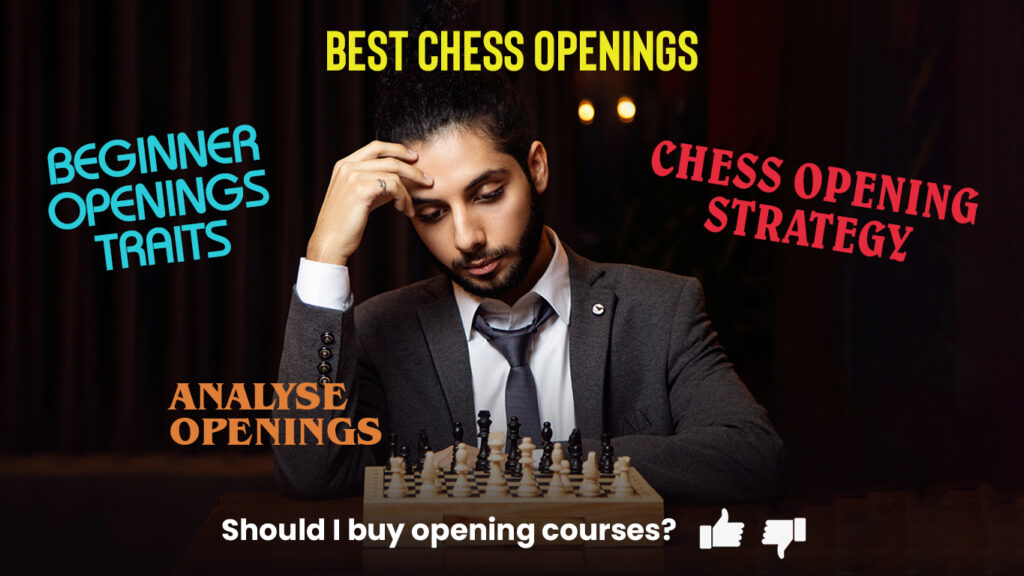Imagine enhancing your chess performance without solving a single exercise. Sounds too good to be true, right?
As a Grandmaster and chess coach, I’ve discovered that certain habits can significantly enhance your game alongside your usual training methods. These habits will help you get the best out of yourself on game days, resulting in better moves and better results.
Here are my 5 key habits that will help you improve focus and avoid blunders in over-the-board Chess games:
Habit #1: Ask Yourself: “What is Their Idea? What Changed in the Position?”
Asking the right questions helps you find the right answers. As a Grandmaster, this question has saved me from numerous blunders. Sometimes, I would be so focused on my plan that I didn’t pay enough attention to my opponent’s move.
Additionally, you can use the second question to spot your opponent’s mistakes. Their move might present a tactical opportunity that wasn’t there before.
Once you tell yourself, “The Bishop on h5 is now unprotected,” your brain will automatically look for tactics involving that vulnerable piece.
Chess Habit #2: Record Your Time
I was fortunate to adopt this habit early in my career. Recording your time is useful when analyzing a game, as it provides insight into where you spent a lot of time and where you might have made hasty decisions.
To remember this information after the game, note your time after every move. Your time usage will help guide you through game analysis. Whenever you spend a lot of time, ask yourself: what alternatives was I calculating? Was I afraid of something?
If you spend less than a couple minutes on a critical move, your mistake wasn’t chess-related; you were either too nervous to think or didn’t recognize the importance of the moment. Managing your time effectively is crucial. You can only improve your time usage if you start to track it.
Chess Habit #3: Blunder Check with This Clever Trick
Writing down a move before executing it is no longer allowed. Many masters did this when it was still permitted. Why?
Your brain perceives things differently when you write down a move. It feels as if you’ve already made it, helping you spot blunders BEFORE committing to them. My sports psychologist suggested a workaround: note your opponent’s time when you decide on a move.
This is legal and serves as a blunder check. The pressure of decision-making lifts, and you’ll catch simple errors before making a move. Initially, it may feel odd to record your opponent’s time when you want to move, but it’ll soon become second nature.
If your move still appears good after this blunder check, go ahead and play it. If not, you just saved the game with this easy habit. Win-Win.
Chess Habit #4: Take Breaks
My longest classical game lasted over 6.5 hours. It was an intense battle with a complex endgame. No one can focus for such a long time without breaks. The optimal focus tends to last between 30 and 60 minutes.
After that, your focus declines with each passing minute without a break. Don’t force yourself to sit on the board for the entire game.
Stand up at least once an hour. During breaks, avoid talking to friends (usually not allowed) or checking other games. Get fresh air, walk around, or splash cold water on your face. Once your brain has recovered, return to the board, and you’ll be amazed at how much more effectively you calculate.
Chess Habit #5: Maintain Stable Blood Sugar
Maintaining stable blood sugar is crucial for focus. I’ve had many games where my brain felt foggy toward the end due to low blood sugar. I hadn’t eaten well before the game and forgot to bring healthy snacks.
The key is to avoid significant blood sugar spikes and maintain a stable level. Stick to water and healthy snacks like dates, bananas, and sports bars. Look for products designed for endurance sports like cycling, tennis, or long-distance running. These products aim to keep blood sugar stable and prevent dehydration.
Combine this habit with taking breaks. Every 60 minutes or so, drink water and have a bite of a suggested snack. If you want to know more about nutrition in chess you can read my in-depth article on it here.
Conclusion
By adopting these five habits, your performance in over-the-board classical games will improve without solving a single exercise. You will also avoid annoying blunders and the feeling of not performing at your best.
Have fun playing over-the-board chess and keep improving your game.
